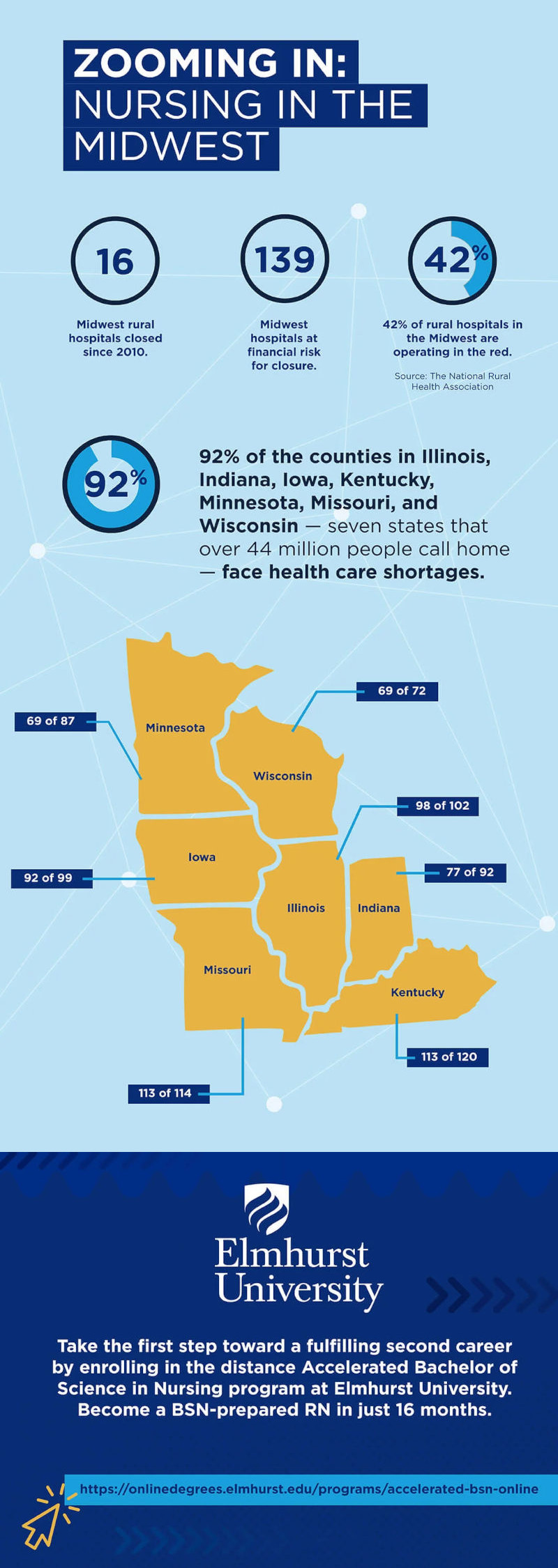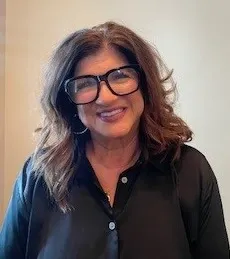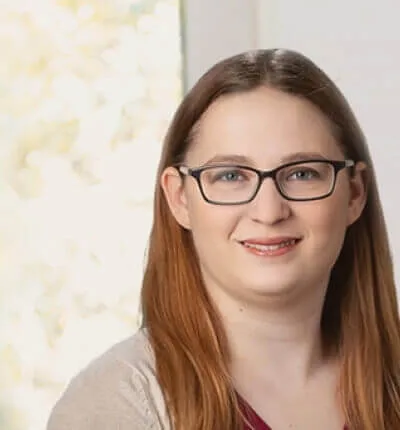Becoming a Nurse in Missouri

If you are planning a second career in nursing, you will want to make sure you understand the many challenges and benefits of becoming a nurse in Missouri.
Nursing is a rewarding career, and becoming a nurse in Missouri has several important steps. Prepare for the education you will need to join the ranks of Missouri nurses.
Demand for Nurses in Missouri
Registered nurses continue to be in high demand in the nation’s workforce, especially in the wake of the COVID-19 pandemic. No matter where you are in your journey to a new career, you can be sure that nurses will always be needed.
The 2020 Missouri Nursing Workforce Report showed that 75% of licensed nurses in the state are RNs and most work in metropolitan counties. It also showed, however, that about 30% of RNs “are age 55 or older and may retire or consider retiring in the near future.”
Nationally, the rate of job growth for registered nurses is projected to be 7% by the Bureau of Labor Statistics (BLS) for the years 2019–2029. Projections specifically for Missouri indicate an annual growth rate of more than 1,200 RN positions through 2028.

Learn More About Elmhurst's Online Accelerated Nursing Programs
How Much Do Missouri Nurses Make?
Not only is nursing emotionally and psychologically rewarding, it is a career with solid earning potential. According to data from the BLS, registered nurses in Missouri earn a median annual wage of $64,220. The top 25% of nurses in Missouri can earn as much as $81,000.
Of course, salaries depend on education, experience level, the health care setting in which you are employed and the local rates of pay. (Over half of Missouri RNs have a baccalaureate degree.) Here are the five Missouri cities/regions with the highest median annual salaries for registered nurses:
- Kansas City, MO: $69,680
- St. Louis: $66,250
- Columbia, $64,120
- St. Joseph: $ 63,520
- Jefferson City: $61,390
Now that you have a sense of what job prospects in the field will look like, here are the main steps you need to complete to become a nurse in Missouri:
- Graduate from a nursing program
- Apply for RN licensure in Missouri
- Pass the national RN licensure examination
- Find RN employment in Missouri
Step 1: Graduate from a Nursing Program
Missouri’s State Board of Nursing sets minimum standards for professional nursing. Typically, there are two paths for entry-level nurses: acquiring an Associate Degree in Nursing (ADN) or a Bachelor of Science in Nursing (BSN).
An ADN is generally a two-year program that provides core skills and education in nursing. It covers subjects such as microbiology, anatomy, chemistry and the foundations of nursing. Programs may also include practical clinical training, where students learn to apply classroom learning in real-life settings, such as hospitals, rehabilitation facilities or community clinics.
A BSN program is usually a four-year course of study that offers liberal arts coursework in addition to dedicated courses on nursing, making it similar to other bachelor’s programs, such as biology or education.
But if you already have a degree in another field, you can select an accelerated program that will allow you to earn a BSN in less than half the time it would take to earn the degree from a traditional program. This is because you have already completed the general baccalaureate requirements with your first degree.
An Accelerated BSN, or ABSN, from an accredited program offers the same education in sciences, clinical methodology and patient care—just in a shorter time frame.
Learn more about Elmhurst University's Distance ABSN program
Step 2: Apply for RN Licensure in Missouri
Graduates of approved nursing programs in Missouri may apply for an RN license with the State Board of Nursing. The application will require you to:
- Present proof of citizenship or lawful residence status
- Submit your official final transcript from the nursing program
- Submit fingerprints for criminal background checks
- Register for the national licensing exam, NCLEX
Once the Board of Nursing has reviewed all your documentation, it will notify the NCLEX testing service that you are eligible to take the test. The testing service will send you an Authorization to Test (ATT) by mail, as well as the testing schedule and the forms of identification you’ll need to present on test day.
Step 3: Pass the National RN Licensure Examination
The NCLEX exam is used by the National Council of State Boards of Nursing (NCSBN) as a way to measure the competencies of people applying for licensure in the states, commonwealths and territories of the United States. It is a first step in protecting the public, by making sure that entry-level nurses can perform their role adequately.
As stated in the NCLEX test plan,
“Nursing is a dynamic, continually evolving discipline that employs critical thinking to integrate increasingly complex knowledge, skills, technologies, and client care activities into evidence-based nursing practice. The goal of nursing for client care is preventing illness and potential complications; protecting, promoting, restoring, and facilitating comfort, health and dignity in dying.”
Nursing students have options to prepare for the exam. There is guidance online, along with practice exams. But accredited nursing programs will usually offer dedicated exam preparation as part of their curriculum.
What does the exam evaluate?
The NCLEX exam, which is usually given in a 5-hour session, runs anywhere from 75 to 145 items. The test questions fall into four domains:
- Safe and Effective Care Environment
- Health Promotion and Maintenance
- Psychosocial Integrity
- Physiological Integrity
Two subcategories comprise the Safe and Effective Care Environment portion of the test: Management of Care, which covers subjects like ethical practice, managing continuity of care and advance directives; and Safety and Infection Control, which includes questions on injury prevention, handling infectious materials and ergonomic principles among other topics.
Health Promotion and Maintenance questions ask about direct nursing care, including conducting health assessments and patient education, plus the nurse’s knowledge of developmental stages, aging and high-risk behaviors.
Exam questions on Psychosocial Integrity are designed to evaluate the nurse’s knowledge of care practices that support a client/patient’s emotional, mental and social well-being. These range from such subjects as abuse or neglect, end-of-life care, family dynamics and cultural awareness/cultural influences on health, among other topics.
The Physiological Integrity portion of the exam can represent anywhere from 38% to 62% of the questions. Question items address four subcategories, including:
- Basic Care and Comfort
- Pharmacological and Parenteral Therapies
- Reduction of Risk Potential
- Physiological Adaptation
When will I get my test results?
Missouri’s nursing board participates in the NCLEX Quick Results program, which allows you to know your score within two days of your test date for a small fee. This is “unofficial” though and does not authorize you to practice as a licensed RN.
Your official results will come from the Board of Nursing, usually within six weeks.
Step 4: Find RN Employment in Missouri
Missouri allows nurses who have graduated from accredited programs to work up to 90 days while they await the results of the NCLEX. Once you have passed that exam, you are automatically licensed to practice.
Once you are licensed, there are several ways to find a nursing position in Missouri. You can use online job search websites, or you can take a more targeted approach. Sites and organizations that specifically cater to nurses, such as the American Nurses Association, can help you find something in the locality you want to work in, and they list salary information as well.
Earn a Nursing Degree Online in Missouri
If you’re interested in becoming a nurse in Missouri and have previously earned a bachelor’s degree in another discipline, consider the distance Accelerated Bachelor of Science in Nursing (ABSN) program at Elmhurst University.
This ABSN program provides intensive preparation in clinical skills and essential nursing curriculum. In as little as 16 months in this full-time program, you’ll be fully prepared to take the NCLEX-RN exam and start working as a registered nurse changing and saving lives.
In addition, you will benefit from attending a school that values personal growth, diversity, human rights and social justice.
Learn more to see if this program is right for you.
Read other blogs in our nursing series:



